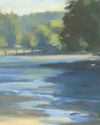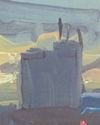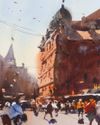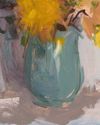
Over the past few issues I’ve been exploring the compositional lessons that we can learn from looking at other artists’ work, taking examples from current exhibitions to encourage you to get out and make studies from the work itself. Making short, focused drawn studies when you visit galleries will encourage you to look at artwork through a practical lens, borrowing lessons from the work that you can apply to your own practice.
In this final instalment I’m going to take the Dutch draughtsman, painter and printmaker Rembrandt van Rijn as my focus to coincide with the forthcoming Rembrandt’s Light exhibition at Dulwich Picture Gallery this autumn.
Rembrandt died on 4 October 1669, so this year marks the 350th anniversary of his death and the exhibition, sitting alongside other major shows of the artist’s work in 2019, celebrates the output of an artist whose atmospheric use of light has embedded itself in the Western cultural imagination.
In this article I’ll look at how Rembrandt used tone as a compositional device in several of the artworks in the Dulwich Picture Gallery exhibition; the desaturation of colours in his paintings, almost entirely devoid of blue with blushes of earthy warmth, make it easy to view his work through a tonal lens.
MANAGING TONAL VALUES
Composition can be defined as the arrangement of contrasting masses on the picture plane; whether those masses are shapes of pattern or colour or areas of light and dark it is their interaction that determines the success of an image.
All two-dimensional pictures are at once abstract and subjective, so to be truly successful a figurative painting must present an engaging subject, while simultaneously working as an arrangement of abstract shapes.
هذه القصة مأخوذة من طبعة October 2019 من Artists & Illustrators.
ابدأ النسخة التجريبية المجانية من Magzter GOLD لمدة 7 أيام للوصول إلى آلاف القصص المتميزة المنسقة وأكثر من 9,000 مجلة وصحيفة.
بالفعل مشترك ? تسجيل الدخول
هذه القصة مأخوذة من طبعة October 2019 من Artists & Illustrators.
ابدأ النسخة التجريبية المجانية من Magzter GOLD لمدة 7 أيام للوصول إلى آلاف القصص المتميزة المنسقة وأكثر من 9,000 مجلة وصحيفة.
بالفعل مشترك? تسجيل الدخول

Still life IN 3 HOURS
Former BP Portrait Award runner-up FELICIA FORTE guides you through a simple, structured approach to painting alla prima that tackles dark, average and light colours in turn

Movement in composition
Through an analysis of three masterworks, landscape painter and noted author MITCHELL ALBALA shows how you can animate landscape composition with movement

Shane Berkery
The Irish-Japanese artist talks to REBECCA BRADBURY about the innovative concepts and original colour combinations he brings to his figurative oil paintings from his Dublin garden studio

The Working Artist
Something old, something new... Our columnist LAURA BOSWELL has expert advice for balancing fresh ideas with completing half-finished work

Washes AND GLAZES
Art Academy’s ROB PEPPER introduces an in-depth guide to incorporating various techniques into your next masterpiece. Artwork by STAN MILLER, CHRIS ROBINSON and MICHELE ILLING

Hands
LAURA SMITH continues her new four-part series, which encourages you to draw elements of old master paintings, and this month’s focus is on capturing hands

Vincent van Gogh
To celebrate The Courtauld’s forthcoming landmark display of the troubled Dutch master’s self-portraits, STEVE PILL looks at the stories behind 10 of the most dramatic works on display

BRING THE drama
Join international watercolour maestro ALVARO CASTAGNET in London’s West End to paint a dramatic street scene

Serena Rowe
The Scottish painter tells STEVE PILL why time is precious, why emotional responses to colour are useful, and how she finds focus every day with the help of her studio wall

Bill Jacklin
Chatting over Zoom as he recovers from appendicitis, the Royal Academician tells STEVE PILL about classic scrapes in New York and his recent experiments with illustration